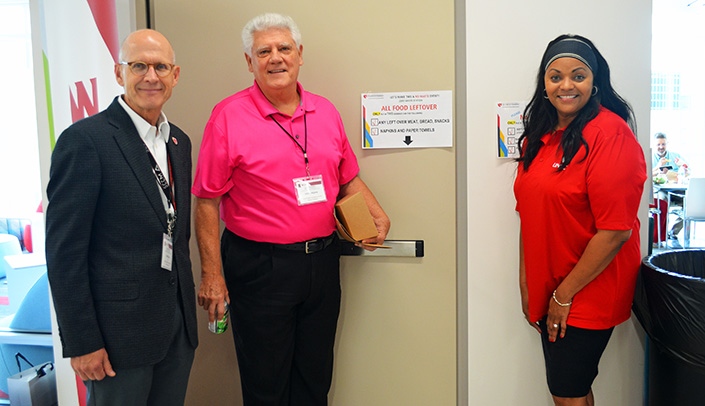You read recently in UNMC Today that the Aug. 28 #WeAreUNMC all-campus BBQ was a “zero-waste event” for the second consecutive year.
But the UNMC College of Pharmacy also recently hosted what is believed to be the first “zero-waste event” conducted by an individual unit or college.
Previous zero-waste events at UNMC have been conducted by the campus itself, as opposed to a single entity taking this initiative.
According to LiveGreen, a zero-waste event has at least 90 percent (by weight, not by volume) of all the material at that event being reused, recycled, or composted. A maximum of 10 percent can go to the landfill.
Kimberly Norman, coordinator of experiential programs at the College of Pharmacy, also is one of pharmacy’s LiveGreen Ambassadors. After serving on the executive committee for the initial zero-waste all-campus BBQ, she was inspired at the possibility her college could do the same.
Pharmacy’s Preceptor Development Retreat, on Aug. 10, pulled off the feat.
“The College of Pharmacy would like to thank our preceptors for their partnership and cooperation in making the zero-waste event a success,” said dean Keith Olsen, Pharm.D.
Melanie Stewart, sustainability manager for Nebraska Medicine and UNMC, said one of the biggest challenges for conducting a zero-waste event is ensuring the right waste goes in the right receptacles. This could mean really educating your audience on what goes where — or, even having someone near the waste stations to make sure.
Norman said she was going to personally double-check each bin. But Stewart said that’s going above and beyond the call of duty — don’t think you need to do that to host a waste-free event.
Two things to consider: food waste will require specific composting, which does come with a fee. And, plastic bags, other soft plastics and styrofoams can be collected in https://www.unmc.edu/newsroom/2019/04/02/livegreen-orange-energy-bags/ orange bags — but they aren’t currently being recycled, so it doesn’t count towards your zero waste goal. However, https://www.plasticfilmrecycling.org/recycling-bags-and-wraps/plastic-film-education-individuals/learn-whats-recyclable/ some soft plastics can be collected for recycling at local drop-off locations (usually grocery stores). But, the med center doesn’t participate in that specific recycling program. So that’s another trip.
But both Norman and Stewart said it’s worth the effort. Start small, Stewart said — maybe host a zero-waste office meeting, or lunch and learn.
Stewart put together a https://livegreennebraska.com/zerowasteeventtoolkit/ Zero Waste toolkit, full of advice and guidelines for putting on a zero-waste event.
